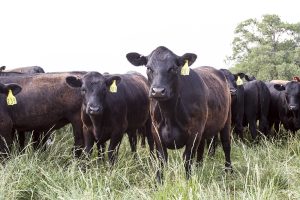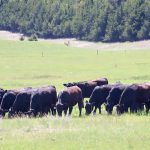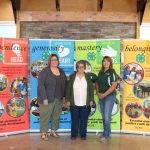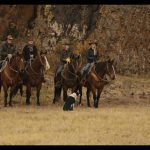Kevin Wiltse Family Receives Kansas Leopold Conservation Award

The Kevin Wiltse family has been selected as the recipient of the 2025 Kansas Leopold Conservation Award®.
The award honors farmers, ranchers, and forestland owners who go above and beyond in the management of soil health, water quality, and wildlife habitat on working land.
Kevin Wiltse and his wife Amanda and their three children farm with his mother. Wiltse Family Farms consists of native range and dryland cropland near Timken. They were presented with the $10,000 award at the Kansas Association of Conservation Districts’ Annual Convention.
Sand County Foundation and national sponsor American Farmland Trust will present Leopold Conservation Awards to landowners in 28 states this year. In Kansas the award is presented with the Kansas Association of Conservation Districts, Kansas Farm Bureau, and the Ranchland Trust of Kansas.
Given in honor of renowned conservationist Aldo Leopold, the award recognizes farmers and forestland owners who inspire others with their dedication to environmental improvement. In his influential 1949 book, A Sand County Almanac, Leopold advocated for “a land ethic,” an ethical relationship between people and the land they own and manage.
Kansas landowners were encouraged to apply, or be nominated, for the award this year. Applications were reviewed by an independent panel of agricultural and conservation leaders from Kansas.
ABOUT KEVIN WILTSE
Kevin Wiltse’s conservation journey began on a bus.
He traveled with his father to Dakota Lakes in 1996 to learn about soil health. The day after returning home, they sold their tillage equipment and bought a no-till drill. But soil health success didn’t come overnight, nor was it achieved relying solely on not tilling the soil.
Ever since that fateful trip, Kevin’s commitment to conservation has driven him to challenge conventional approaches and pursue untested methods of farming. The result has been a more profitable business, one less reliant on commercial inputs and subsidies, while balancing agricultural productivity with ecological integrity.
One of the most transformative aspects of his strategy has been successfully transitioning more than 500 acres of conventional cropland to native perennial grasses and forbs, without cost-share assistance. By fostering deep-rooted plants, he improves soil structure, enhances water retention, and mitigates the impact of drought.
Enhancing biodiversity while preventing erosion is why Kevin also began growing cover crops within his normal rotation of crops. The presence of continuous ground cover provided more options to graze beef cattle year-round.
Beyond individual farming techniques, Kevin’s success lies in his mindset. He partners with nature rather than trying to control it. This philosophy drives experimentation with interseeding crops, biological amendments, and perennial cool-season planting. Each practice reinforces his farm’s ability to withstand unpredictable weather and market conditions.
Kevin, and his wife Amanda and their three children farm with his mother. Wiltse Family Farms consists of native range and dryland cropland spread across three counties.
Kevin made sweeping changes to the farm’s business model after attending the Ranching for Profit School in 2013 amid a three-year drought. He decided to rely less on cash crops and more on grazing cattle.
The large, intact land base at Wiltse Family Farms has made grazing and moving livestock easier. The borders of farm fields, planted with diverse perennial vegetation, are fenced in to serve as travel lanes between pastures for cattle. These perennial borders attract beneficial pollinators and pheasants. About 30,000 feet of water lines were installed to distribute water to stock tanks. The only cash crops grown now are, milo, triticale and rye, all of which can double as forage for livestock and wildlife.
Kevin credits rotationally grazing livestock on cover crops and diverse perennial pastures with accelerated restoration of the soil. His pastures have remained green during recent periods of drought. More grass on the ground attracts more wildlife and insects, which Kevin considers a good indicator of success.
Kevin’s impact extends beyond his own farm with speaking engagements and mentoring other landowners. Leading experts in regenerative agriculture seek his insights. Yet, he admits that 30 years ago as a Kansas State graduate, he was more concerned with crop yields than soil health and bird habitat.
“You need to be at your place and time to do this,” he said.
Much like the bus tour he took years ago, he encourages others to visit farms and ranches that utilize conservation practices, and to then experiment on a few acres at home.
Peers and visitors are consistently inspired by Kevin’s quiet and humble stewardship. His willingness to test and refine methods is pushing conservation agriculture forward, while establishing a model for future generations.
ACCOLADES
“The management practices of Wiltse Family Farms prove the impact that can be made toward improved soil and land sustainability,” said Mike Beam, Kansas Secretary of Agriculture. “We appreciate Kevin Wiltse’s commitment to conservation on his land over several decades. This award is a testament to his bold leadership in demonstrating the value of land preservation in agriculture.”
“Through adaptive rotational grazing of livestock on perennial grasses and cover crops, Kevin and Amanda improve soil health on their farm while supporting pollinator and wildlife habitat,” said Dan Meyerhoff, Kansas Association of Conservation Districts Executive Director. “Their dedication to regenerative agriculture and willingness to share their journey has been benefitted many others that are looking to implement conservation practices on their farms.”
“RTK is delighted to announce that Kevin and Amanda Wiltse of Timken are the Kansas Leopold Conservation Award recipients,” said Barth Crouch, Ranchland Trust of Kansas Board Chairman. “They have worked hard to fulfill their commitment to conservation for many years. Kevin has been very strong in sharing his efforts and projects with other ranchers and farming families across the state.”
“We’re so grateful for stewards like the Wiltse family who recognize conservation is an investment in the prosperity of future generations,” said Joe Newland, Kansas Farm Bureau President. “Kevin and Amanda show the tangible rewards of caring for their land, and they are an extraordinary example for the rest of us in agriculture.”
“These award recipients are examples of how Aldo Leopold’s land ethic is alive and well today,” said Kevin McAleese, Sand County Foundation President and CEO. “Their dedication to conservation is both an inspiration to their peers as well as a reminder to all how important thoughtful agriculture is to clean water, healthy soil, and wildlife habitat.”
“As the national sponsor for Sand County Foundation’s Leopold Conservation Award, American Farmland Trust celebrates the hard work and dedication of the award recipients,” said John Piotti, AFT President and CEO. “At AFT we believe that exemplary conservation involves the land itself, the practices employed on the land, and the people who steward it. This award recognizes the integral role of all three.”
Among the many outstanding landowners nominated for the award were finalists Daryl and Jody Donohue’s DL Cattle Company in Fredonia. The first Kansas Leopold Conservation Award was presented to Sproul Ranch of Sedan in 2015. Last year’s recipient was the Barby Ranch of Protection.
The Leopold Conservation Award in Kansas is made possible thanks to the generous support of American Farmland Trust, Kansas Association of Conservation Districts, Kansas Farm Bureau, Ranchland Trust of Kansas, Sand County Foundation, Farm Credit Associations of Kansas, ITC Great Plains, Kansas Department of Agriculture (Division of Conservation), Kansas Department of Wildlife and Parks, Kansas Ducks Unlimited, Kansas Forest Service, Kansas Grazing Lands Coalition, USDA Natural Resources Conservation Service, and Green Cover Seed.
For more information, visit http://www.leopoldconservationaward.org.

–Sand County Foundation




